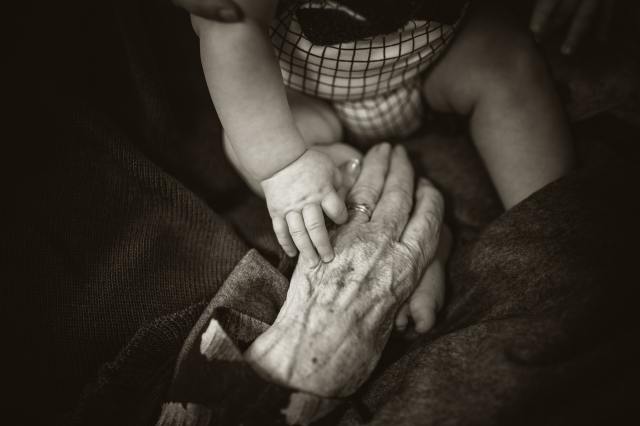
Are you happy? The question is innocent enough. My four-year-old who is running around the house with his plastic sword in case we get attacked by Princess Robots (yeah, don’t ask) stops dead in his tracks to ask me.
I’m always happy when I’m with you, I instinctively reply. The truth, the truth, I’ll always tell him the truth, I think to myself as I justify the obfuscation by rationalizing that I am indeed always happy in his presence. But this prescient, empathic, stubborn-persistent little boy follows up: Are you happy when you’re sad? I smile. Caught.
In the moment’s melancholy and awed by his ability to read me, I answer: Yes. I’m thinking of your Abuelo. And I’m happy and sad. Content that he got the answer he knew was right, he moved back to the Princess Robots. An Abuelo he’s never met. An Abuelo who would revel in his prescient, persistent precociousness. An Abuelo who doesn’t know he exists.
The earliest memory I have of my Father, is of him giving me 15 cents (I am that old) to go to the corner of the strip-mall to buy a colada. For the uninitiated, a colada is a cup, yes a cup, of espresso that is then poured into tiny cups that people do as shots. He would watch me from one end of the strip-mall as I walked to the other end, to make the purchase at the bakery window. Most bakeries in Miami, at least those that aren’t particularly fancy, have take-out windows. I could do this because at six-years-old I was a big-boy. And, I was allowed certain freedoms and responsibilities.
By eight-years-old, I was helping him in the family business; digging in the earth, planting trees, fertilizing plants. But not too much. My brother did most of that work, with rare protest. I was the fancy child even then. I can, however, still recite the mantra he instilled in me: Make the hole bigger than the root ball so that it fits comfortably in the ground; throw some loose dirt at the bottom and around the root ball to make it easier for the roots to spread; don’t pack the dirt too tightly, you’ll just get in the tree’s way; water, fertilize and leave the rest to nature. I still plant trees in the same way. Little did I know then, the old man was also teaching me how to raise a child. But that’s the subject of another essay. Always leave them wanting more.
By age 15, we would get into ferocious arguments about the need to lift the trade embargo against Cuba. I was for lifting, he was against. His heart still freshly bleeding from the wounds of having to leave a country he loved; even though it had been almost 30 years by then. Of course, during that time, my Father knew nothing, and I knew everything. Still, I marveled in awe with how he could recall with precision his exploits in Cuba and Venezuela, at first selling fruit on the streets with my Mother to eke out a living in support my brother and sister, long before I was born. Then later, owning businesses that were acclaimed by heads of state. I still wish I had told him then how much I loved his stories.
In my early 20s the distance grew between us—physical distance; as I left that godforsaken city and traveled to Washington, D.C. to study. I made the begrudging weekly phone calls. And I remember one in particular. I was on the verge of quitting law school: emotionally wrecked, overwhelmed, and anxious as all. Yet, using every ounce of skill he had as the finest negotiator in the world, he talked me off the edge of the cliff. Not too bad for a guy who never got past the sixth grade. This time, he recalled with great joy my great exploits, and how proud he was of me. He drew on examples of things I had long since forgotten or thought trivial; yet, in his fatherly eyes were luminous.
In my 30s our relationship hit its emotional stride. My Father knew everything, and he acknowledged I knew some things. In his 70s he was funny, uncensored, irreverent, and sharp-as-a-tack. He would go toe-to-toe with me, and with my husband quip for quip. He would regale us with stories of things that happened when I was a child; of his adventures with my mother; of my siblings. We traveled the world together. But we did notice his short-term memory started to fail.
One Thanksgiving, while staying at my sister’s house for a week, I noticed my Dad had been washing his underwear daily in the sink. I checked his suitcase, sure enough, his then-wife had packed him enough underwear for the entire stay. I asked him why he was washing his underwear. I need clean underwear, he answered.
At 93 Dad remembers nothing. The deterioration was slow. And painful. And excruciating to watch. And the memories that are locked inside that, yes, beautiful mind are inaccessible.
My son does not know his Abuelo. I will regale him with stories that are locked in my mind, for as long as I am able. Stories about that prescient, empathic, stubborn-persistent man that he will never meet; a man that he would revel in. A man that in his youth, as a prescient, persistent precocious child, worked the sugar cane fields to support his family. A man that talked me off many a ledge. A man that raised his own brothers. A man that knew to give a root ball space. A man that was happy, even when he was sad.
And even though I am a more imitation than original, he will still hear his voice. And together they will fight the Princess Robots.











